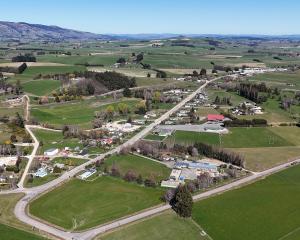
Given its role is, as the name implies, to scrutinise the thousands of regulations promulgated by the government annually, it has a reputation for being somewhat esoteric at best and nerdy at worst.
However, it is also a good training ground for backbench MPs as they learn the intricacies of the law-making process.

Next week, however, the regulations review committee is set to rise from obscurity and take its place in the front lines of the culture war, thanks to Southland National MP Joseph Mooney.
At the end of each order paper (the government’s daily agenda of business in the House of Parliament) sits the notices of motion section, where any MP can suggest that the House take notice of anything at all.
Diamond wedding anniversaries and 100th birthdays often appear, and Dunedin Labour MP Ingrid Leary has one there at the moment: Dutch Week.
Added in on April 8 was a notice in Mooney’s name that the House disallow a provision of the Professional Examinations in Law Regulations 2008.
(It turns out that any member of regulations review committee can make a notice of motion to strike down a regulation and that it takes effect within 21 sitting days unless otherwise dealt with. Who knew?)
So, why is Mooney (a lawyer) so vexed with the examination system he had to pass to qualify to practise?
Well, he is not per se - just the bit which the New Zealand Council of Legal Education (NZCLE) added two years ago, coming into effect this year, which requires that tikanga Māori be a compulsory component of all other compulsory subjects.
This proposal caused quite the stir in legal circles when it first surfaced.
The most high-profile dissent was that of Gary Judd KC, who as well as writing extensively on the subject also formally complained to the committee about it last year.
Judd does not object to tikanga as such, noting that it is obviously relevant in cases such as those determining customary title to Maori land.
However, he does object to "the holus-bolus adoption of tikanga as if it were part of the common law developed by the courts incrementally" and also the requirement for law students to study it, alongside property, criminal, contract and public law.
Judd is correct that tikanga is starting to assume a more prominent place in law.
Notably it was central to discussion in Takamore v Clarke (the so-called "body snatching" case, when a hapu buried a relative in defiance of the wishes of his immediate family).
In 2022 the Supreme Court issued a separate ruling as part of its consideration of the Peter Ellis case as to whether tikanga had a place in law.
Their honours decided that it did.
This was a development which many lawyers had no quibble with and took in their stride.
It was also why the NZCLE amended its regulations feeling, not unreasonably, that given a ruling by the land’s highest court it was probably appropriate that people who wished to be admitted as lawyers should possess some knowledge and understanding of tikanga Māori as a core competency.
Judd and several other lawyers (notably former Russell McVeagh lawyer Winston Peters) begged to differ however, hence Judd’s complaint.
The committee, including Mooney, heard Judd’s complaint in mid-October last year and it also considered a submission in support of it from Auckland lawyer Thomas Newman, which raised the possibility that standing orders allowed the course of action which Mooney has now embarked upon.
The committee, whose membership includes Waitaki National MP Miles Anderson, issued its report in March.
The committee found that that the NZCLE regulation did not trespass unduly on personal rights and liberties, that the council did have the power to impose the regulation.
However, its three National MPs (the majority), found that although the NZELC had acted within its powers, the regulation to make tikanga Māori a compulsory component was an "unusual and unexpected use" of the council’s powers and hence should be disallowed.
Judd has had the good luck, from his perspective, that the government has changed since the Ellis judgement.
His objections would likely have fallen on stoney ground in 2023, but in 2025 the committee majority was like-minded, Mooney was there to move his notice of motion, and the business committee decided to adopt it as House business.
It will be debated the next members’ day (this coming Wednesday) and the odds are $1.01 and falling that the motion will be agreed to.
The Geraldine insurrection
IT turns out that there is another live issue in the southern seats when it comes to the proposed electoral boundaries.
We are sure it is nothing personal about Waitaki’s MP, but it turns out there are a substantial number of residents in the good town of Geraldine (population 3310) displeased about being in Anderson’s electorate.
Despite being 38km to the north of the Canterbury town of Timaru - whose territorial authority Geraldine sits in for local government purposes - its voters make their mark at a national level in the Otago seat of Waitaki.
Whether from provincial parochialism or administrative practicalities, Geraldine folk are casting longing eyes towards the electorate of Rangitata.
Objections to the proposed new boundaries were released last week and several people have so far objected to their place in the world.
"I object to being part of the Waitaki electorate when all our services and amenities are in the Rangitata electorate," one voter said, while another noted that Rangitata was under quota and Waitaki was over quota so Geraldine should be allowed to return home, so to speak.
The deadline for submissions is May 21, so there is still time for a full-on revolt to break out.












